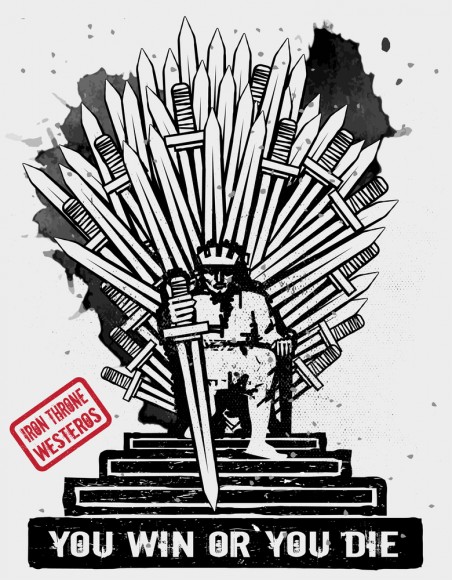Business Psychology Meets ‘Game of Thrones’: Who Should Lead Westeros?

For those of us who delight in the understanding and critical evaluation of human behavior, GoT throws up interesting questions about the leadership and managerial capabilities of a number of key characters. This is a topic that provokes fierce debate and conflicting opinions. Although strength and sword-fighting techniques make for great T.V., these generally aren’t the sole skills a leader needs to be effective, be it in Westeros or the real world.
So, which character has the leadership skills required to rule the Seven Kingdoms – and which ones are in dire need of immediate executive coaching?
As a business psychologist, I thought I would put my years of experience to the test by weighing the various characters to find out who would be the best fit to lead Westeros:
1. Jon Snow: The Reluctant Leader
The one thing we can definitively say about Jon Snow is that he is not especially power-hungry, nor is he looking for personal glory. In fact, he was a reluctant leader who had responsibility thrust upon him as Lord Commander of the Night’s Watch. He is a great example of how most leaders are made, not born. He wasn’t born into the best situation, but over the years, he has developed a great number of leadership qualities.
Jon Snow is a good listener. He takes advice from the counsel of advisors, and he truly appreciates every member of his team. In turn, he earns a huge amount of respect from his followers. He brings a diverse range of often conflicting people together and unites them toward a common goal; we can look to the Wildlings and the men of the Night’s Watch as a great example here.
While reluctant in his role, Jon Snow is by no means a pushover. When his team steps out of line (by trying to kill him), he holds them accountable. Generally, Jon has demonstrated that he is a fair leader who gives and in turn receives both trust and respect from his team. He realizes that when you treat your team well, they will be more likely to engage with purpose under a common vision, remain on board, and fight alongside you.
Although he has shown that he possesses the ability to unite and lead an effective team, the question remains: Does Jon Snow actually want to rule Westeros? The answer appears to be “No.” He never asked for power, he hasn’t said he wants to be king, and he’d probably welcome a quiet life. According to Max Weber, the three essential features of political leadership are passion, responsibility, and judgment. Jon certainly accepts responsibility when he needs to, but over the years, we have seen that he doesn’t always have the best judgment. Most importantly, he lacks passion for the role, which puts him out of the race.

Of all the Game of Thrones characters, Daenerys really knows how to rally her troops. She has rebounded from many a compromising situation, commands loyalty, and knows how to deliver an epic speech. Daenerys has a way with words, a strong moral compass, and a real drive to win the Iron Throne – something she believes she should have inherited in the first place.
Daenerys takes her responsibilities seriously and doesn’t take any of her followers for granted. She’s a conscientious leader who takes into account the individual skills and strengths of her group, something Gallup has shown boosts employee engagement by 73 percent. She would be right to prioritize engagement, as high employee engagement reduces turnover by 54 percent.
Research has shown that leaders who demonstrate hope, stability, compassion, and trust earn loyal followers. These are characteristics Daenerys has in abundance. She has been steadfast and optimistic about eventually leading the Seven Kingdoms since the beginning. Her compassion and sense of morality resulted in thousands of slaves being freed, and she openly trusts and earns trust in return. As we all know, trust in leadership is incredibly important.
Of course, Daenerys is young. Her naivety often causes her to make reactive, ill-thought-out decisions. An experienced executive coach would encourage her to carefully weigh her strategy and consider the consequences of her actions. Importantly, she’s open to new ideas and feedback. Although she has a lot to learn, she certainly possesses the building blocks of great leadership. Daenerys puts other people first, openly communicates her plans, and never loses sight of what really matters.
3. Cersei Lannister: An Old-Fashioned Authoritarian
Cersei is nothing if not strong. She might come across as vicious, heartless, and cold, but she grew up needing to be in a brutal, male-dominated world. Perhaps more than anyone, Cersei is aware of what it takes to rule the Iron Throne – and what you need to sacrifice to keep hold of it.
Cersei is emblematic of an old-fashioned, autocratic form of leadership. People, both in the real world and in Westeros, are no longer satisfied with strict authoritarian approaches to leadership. They want someone who is able to unite, lead, and encourage. This certainly isn’t Cersei’s forte.
Cersei doesn’t trust anyone, and it’s easy to see why people don’t trust her. She is incapable of creating a united, high-performing team. Employees and followers alike want their leaders to be honest, authentic, and open, but these aren’t qualities Cersei has worked on developing over the years. Perhaps a leadership development program is in order.
Though she doesn’t have the appropriate leadership qualities, Cersei isn’t likely to go down without a fight. She is determined, has a clear line of sight, and, importantly, has nothing left to lose. Although she might fight tooth and nail to get the Iron Throne, she definitely isn’t the top contender for a long and successful reign.

Tyrion is one of the most charismatic and personable characters on the show. He has a strong sense of self and a great degree of confidence. This authenticity, which is critical for great leadership, can be clearly observed in one of his most famous quotes: “Never forget what you are. The rest of the world will not. Wear it like armor, and it can never be used to hurt you.”
Although Tyrion always remains true to himself and is very aware of his strengths and faults, he is more than willing to improve upon his weaknesses, which is why he is constantly reading. He has a thirst for knowledge and information because, as he puts it, “a mind needs books like a sword needs a whetstone.” This is a prospective leader who realizes that intellect and strategy can be far more powerful than blunt force.
In addition to his wisdom and his enthusiasm for personal development, Tyrion is a good listener and an effective coach. He is happy to delegate work to his teammates and observant enough to recognize, and work with, the strengths and weaknesses of others.
Tyrion’s intelligence and confidence can, however, get in the way at times. The siege on Meereen, for example, happened because Tyrion tried to negotiate with the masters instead of standing up to them. In addition, the attack could have been averted had Tyrion paid more attention to the opinions of Grey Worm and Missandei.
The most important fact to keep in mind about Tyrion and his prospects for leadership, however, is that he clearly doesn’t want the Iron Throne. As such, he’s unlikely to have the passion necessary to be an effective leader – it would distract from his reading! He’s best served in the position of adviser to the next great ruler.
5. Brienne of Tarth: Authentic and Loyal
Brienne might seem like an odd choice for this list for two reasons. First, she doesn’t have any rightful claim to the throne. While this is true, it shouldn’t affect our hypothetical discussion of whether or not she’d be a great leader. Sometimes the best leaders come from left field. Second, Brienne has been a perfect follower up until now. Why would we consider a knight for this leadership role?
The fact of the matter is, most leaders aren’t born, but made. No one enters the world leading a team. At some point, all leaders were followers. Followers who nurture the right qualities and have the self-awareness to manage their faults, learn the right lessons, and stay true to themselves can ultimately become leaders. Brienne has all the building blocks of an authentic, inspirational leader.
Brienne is loyal, grounded, and determined in her role. She is intelligent and a great coach, as we can see from her mentoring of Podrick. Her suitability to properly lead depends again on her own motivations. Ultimately, she appears to prefer to serve and to propel others on to greatness.
–
Weighing all the contenders above, it is quite clear that despite her faults, Daenerys is the most appropriate leader for Westeros. She has the drive, the skills, and the willingness to accept the opinions and wisdom of others. The remainder of the characters mentioned either aren’t suited or lack the passion or drive for leadership. What we can be sure of is Daenerys would be a fair, enlightened ruler who has it in her to lead Westeros out of winter – with the assistance of a few dragons.
Nick Davis is a business psychologist and director at Davis Associates.

